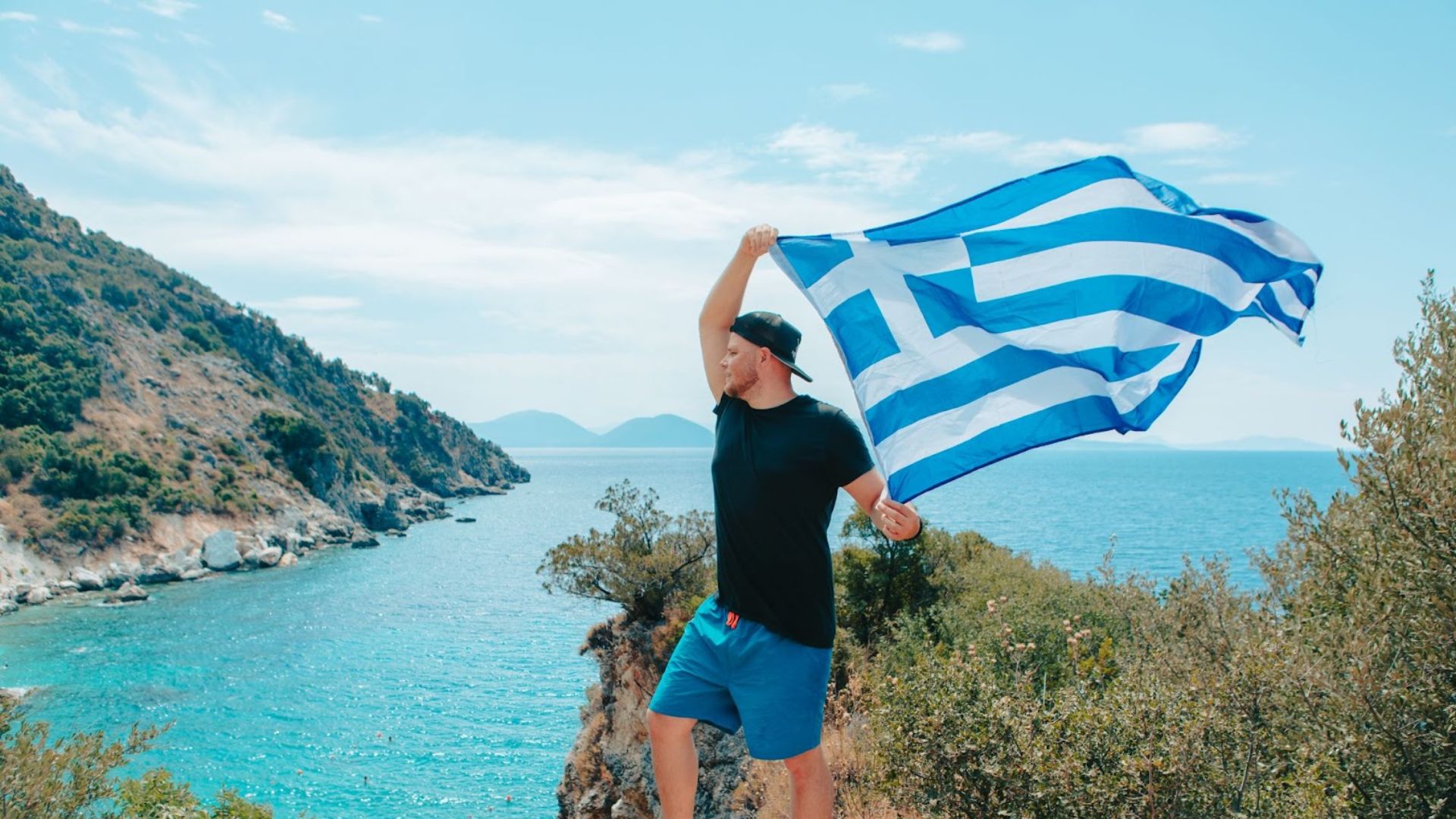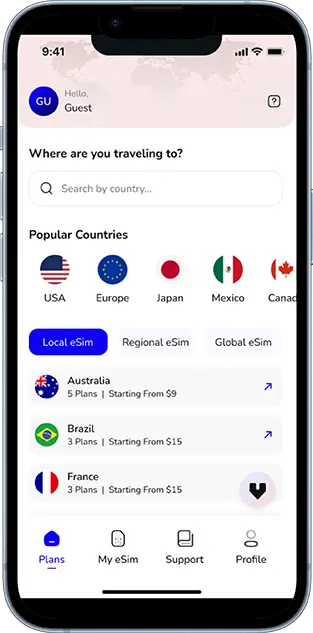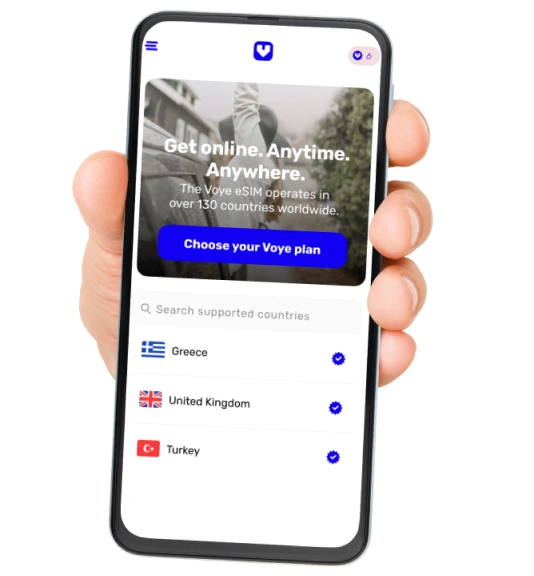Note that iPhone devices from Mainland China aren’t eSIM compatible. Also iPhone devices from Hong Kong and Macao aren’t compatible (except for iPhone 13 Mini, iPhone 12 Mini, iPhone SE 2020 and iPhone XS)
Traveling through Greece is often described as stepping into a living postcard-where ancient ruins meet turquoise seas and warm hospitality greets you at every turn. Yet, even in such a dream destination, travelers can easily make mistakes that take away from the experience. From cultural misunderstandings to overspending in tourist hubs, the smallest missteps can lead to frustration, missed opportunities, or even offence to locals.
Understanding what to avoid is just as important as knowing what to see. By learning how to navigate local customs, respect sacred sites, pack wisely, and plan around seasonal rhythms, visitors gain far more than a checklist of attractions-they discover authentic moments and deeper connections with the Greek way of life. This guide highlights the most common blunders tourists make and, more importantly, offers practical solutions to ensure your journey through Greece is smooth, respectful, and unforgettable.
1. Cultural Misunderstandings to Avoid
Traveling in Greece is more than sightseeing and island-hopping; it’s about immersing yourself in a country where traditions, festivals, and customs still shape daily life. Tourists often overlook these details, which can unintentionally cause tension with locals.
Problem:
- Many travelers underestimate how festivals like Orthodox Easter or saints’ feast days impact daily routines.
- Shops close, transport slows, and villages gather for processions, leaving tourists frustrated when their plans stall.
- At monasteries or churches, casual dress such as shorts or sleeveless tops and loud behaviour can be seen as disrespectful.
- These unintentional acts create distance between visitors and locals, disrupting the warm welcome Greece is known for.
Solution:
- Research the cultural calendar before your trip and plan for closures during major holidays.
- Treat these events as opportunities-join candlelit Easter services or taste seasonal dishes like lamb and tsoureki.
- Carry a scarf or wrap to follow modest dress codes at religious sites.
- Keep your voice low in churches and monasteries to respect the solemn atmosphere.
- Learn simple Greek greetings such as “Kaliméra” (Good morning) or “Efharistó” (Thank you) to show appreciation.
- Embrace the slower pace by enjoying a relaxed coffee or exploring quiet streets during downtime.
By showing awareness and flexibility, what may first appear as a disruption can become one of the most rewarding aspects of your trip. Respecting Greece’s cultural rhythm deepens your experiences and helps you build more authentic connections with the people you meet.
2. Dining and Food Etiquette Mistakes
Food in Greece is not just a meal; it is an essential part of the culture and a way of connecting with others. However, many travelers make mistakes at the table that can unintentionally offend or leave them feeling out of place. Knowing the basics of dining etiquette helps you enjoy Greek cuisine the way locals do.
Problem:
- Tourists often rush meals, treating dining as a quick stop rather than a slow social occasion.
- Ordering only familiar international dishes means missing out on authentic Greek flavours.
- Some visitors assume tipping is the same as in their own country, leaving too much or nothing at all.
- Missteps like wasting bread, refusing shared dishes, or starting before everyone is served can appear impolite.
- Confusion about table manners, such as not knowing that water and bread are standard additions, can create awkward moments.
Solution:
- Treat meals as leisurely experiences-Greeks value long conversations over food.
- Be adventurous and try local specialities like moussaka, souvlaki, or fresh seafood.
- Tip modestly, usually rounding up the bill or leaving 5-10% in cash.
- Share dishes, especially meze (small plates), and wait until others are served before eating.
- Accept bread and water gracefully-they’re part of Greek hospitality.
- Show appreciation to staff with a smile or a simple “Efharistó” (Thank you).
By observing these simple dining customs, meals in Greece become more than just eating-they turn into cultural experiences. Respecting the local rhythm of dining not only enhances the taste of Greek cuisine but also helps you connect with the warmth and generosity of its people.
3. Transportation and Island-Hopping Errors
Exploring Greece often means navigating ferries, buses, and flights to reach its famous islands and historic mainland sites. While the transport network is extensive, many tourists make avoidable mistakes that turn travel days into stressful experiences.
Problem:
- Travelers underestimate how long ferry journeys can take, especially between less-connected islands.
- Booking last-minute during peak season often results in sold-out tickets or higher prices.
- Tourists sometimes treat Greek islands as “hop-on, hop-off,” cramming too many stops into a short trip.
- Misunderstanding bus or metro timetables leads to long waits or missed connections.
- Arriving at ports late, not realising boarding can start an hour before departure, causes unnecessary panic.
Solution:
- Research ferry routes in advance and choose logical clusters of islands (e.g., Cyclades or Dodecanese) instead of distant combinations.
- Book ferry or domestic flight tickets early in summer to avoid inflated prices or full sailings.
- Allow buffer days in your itinerary rather than planning back-to-back connections.
- Use official transport apps or ask locals for updated timetables, as schedules can change.
- Arrive at ports well ahead of time to check in smoothly and avoid last-minute stress.
- Consider slower ferries or overnight routes for budget-friendly and scenic options.
By planning transport realistically and avoiding the urge to rush between islands, you’ll gain more time to immerse yourself in each destination. Smart scheduling transforms travel days from a hassle into part of the Greek adventure, letting you enjoy the journey as much as the arrival.
Reliable Data Everywhere
From Athens to the islands, enjoy reliable internet with Voye eSIM.
4. Overpacking and Luggage Blunders
Packing for Greece can feel tricky, with its mix of historic sites, bustling cities, and relaxed islands. Many travelers overpack or bring the wrong items, making their journey more stressful than it needs to be.
Problem:
- Tourists often pack heavy suitcases full of clothes, forgetting that cobbled streets and stairs in old towns make dragging luggage difficult.
- Bringing bulky items like hairdryers, multiple pairs of shoes, or unnecessary gadgets quickly adds weight.
- Packing only beachwear leaves visitors underprepared for religious sites where modest clothing is expected.
- Forgetting essentials like comfortable walking shoes, sun protection, or adapters leads to extra costs and frustration.
- Carrying valuables or too many luxury items increases the risk of loss or theft.
Solution:
- Travel light with versatile outfits in breathable fabrics, such as cotton or linen.
- Choose a sturdy backpack or small suitcase that’s easier to manage on ferries, buses, and narrow streets.
- Pack at least one modest outfit (long trousers, scarf, or shawl) for monasteries or churches.
- Include essentials: good walking shoes, sunscreen, hat, reusable water bottle, and universal plug adapter.
- Leave unnecessary valuables at home and keep only what you need for safety and convenience.
- Use packing cubes or organisers to keep items neat and avoid rummaging through your bag.
Smart packing means less stress, smoother travel days, and more freedom to enjoy Greece without being weighed down. With the right balance of essentials and modest choices, your luggage works for you rather than against you, making every step of the journey easier.
5. Money, Budgeting, and Shopping Mistakes
Greece offers everything from affordable street food to luxury shopping, but tourists often make financial mistakes that either strain their budget or cause unnecessary hassles. Knowing how to handle money wisely ensures a smoother trip.
Problem:
- Relying only on credit or debit cards can be risky, as smaller villages, tavernas, or kiosks often prefer cash.
- Many travelers don’t realise that ATMs in tourist areas may charge high withdrawal fees.
- Overspending on souvenirs, especially mass-produced trinkets, leaves visitors with items of little value.
- Ignoring budgets while island-hopping or dining out results in unexpected costs.
- Some tourists forget to check currency conversion rates, paying more than necessary when using cards.
Solution:
- Carry a mix of cash and cards, with enough euros for small purchases or emergencies.
- Use ATMs attached to major banks rather than independent ones to avoid extra fees.
- Prioritise authentic souvenirs like olive oil, honey, ceramics, or local crafts over generic imports.
- Track expenses daily to keep within budget, especially in busy tourist hubs.
- Pay in euros rather than foreign currency options on card machines to avoid poor exchange rates.
- Bargain politely in markets, as haggling is sometimes expected, but always with respect.
By being mindful of money, you avoid unnecessary stress and enjoy the best of Greece without financial surprises. A balanced approach-carrying cash, budgeting smartly, and shopping for authentic items-ensures that your spending enriches your trip rather than diminishing it.
6. Behaviour That Frustrates Locals
Greek hospitality is world-famous, and most visitors are welcomed warmly. However, certain behaviours-often unintentional quickly irritate locals and create distance. Understanding local expectations makes interactions smoother and more enjoyable.
Problem:
- Loud voices or disruptive behaviour in quiet neighbourhoods, especially late at night, disturb the local pace of life.
- Tourists sometimes treat village squares, churches, or family-run tavernas as “tourist attractions” rather than community spaces.
- Failing to greet shopkeepers or servers before asking for something can be perceived as rude.
- Disregarding queues, cutting in line, or showing impatience with slower service frustrates locals.
- Taking photos of people without asking permission, particularly in villages, invades personal space.
Solution:
- Keep your voice down in public areas, particularly during evenings when families gather.
- Respect community spaces by observing first, sitting, ordering a drink, and joining in quietly.
- Use polite greetings such as “Kaliméra” (Good morning) or “Kalispera” (Good evening) when entering shops or restaurants.
- Wait your turn in queues and accept the slower pace as part of Greek life.
- Always ask permission before taking photos of people, especially elders in traditional villages.
- Show appreciation with smiles, eye contact, or a simple “Efharistó” to build rapport.
Small gestures of courtesy go a long way in Greece. By respecting local rhythms, showing patience, and treating people with kindness, tourists not only avoid frustration but also gain a more genuine welcome. These little efforts turn brief interactions into memorable cultural exchanges.
7. Beach and Nature Etiquette Blunders
Greece’s beaches, mountains, and islands are some of its greatest treasures, yet many visitors unintentionally damage these environments or act in ways that clash with local expectations. Respecting natural spaces ensures they remain pristine for everyone.
Problem:
- Leaving litter, cigarette butts, or plastic bottles behind is a common tourist mistake.
- Taking pebbles, sand, or shells as “souvenirs” damages fragile ecosystems.
- Playing loud music or crowding small coves disrupts the peaceful atmosphere that locals value.
- Ignoring rules about protected areas, like turtle nesting beaches, harms wildlife.
- Hiking without preparation, proper footwear, or water leads to accidents and strains on rescue services.
Solution:
- Always clean up after yourself-use bins or carry rubbish out with you.
- Leave natural items where they belong; photos make better souvenirs.
- Keep noise levels low to preserve the serene beauty of beaches and coves.
- Follow posted signs in protected areas and avoid disturbing wildlife.
- Prepare for hikes with water, good shoes, and respect for marked trails.
- Support eco-friendly businesses and activities that help preserve Greece’s landscapes.
By treating Greece’s beaches and natural spaces with care, you not only protect the environment but also experience them as locals do-peaceful, beautiful, and authentic. Responsible choices ensure that these treasures remain intact for future travelers and generations to enjoy.
8. Historical and Archaeological Site Mistakes
Greece is a living museum, with ancient temples, ruins, and artefacts scattered across the country. While these sites attract millions of visitors, many make mistakes that diminish the experience or even cause damage. Respecting these treasures ensures both a deeper visit and their preservation.
Problem:
- Touching statues, leaning on ruins, or climbing restricted areas damages fragile remains.
- Tourists often rush through sites, taking photos without learning the history behind them.
- Wearing unsuitable footwear makes it hard to walk on uneven stones, causing slips or accidents.
- Eating, drinking, or leaving rubbish at heritage sites disrupts the sacred and historic atmosphere.
- Some visitors ignore signage or guides, missing valuable context and important rules.
Solution:
- Follow all posted signs and avoid touching or climbing ancient structures.
- Take time to read plaques, hire a guide, or use audio tours to appreciate the stories behind the ruins.
- Wear sturdy shoes with grip for walking on marble paths, cobblestones, and uneven terrain.
- Keep food and drinks outside the archaeological zones, preserving the respect they deserve.
- Treat these spaces with quiet appreciation, giving yourself time to absorb the atmosphere.
- Photograph respectfully, avoiding disruptive poses or blocking others’ views.
Approaching Greece’s historical landmarks with respect transforms a simple visit into a meaningful encounter with the past. By valuing their fragility and history, you help preserve these wonders for future generations while gaining a richer, more memorable travel experience.
Hassle-Free Connectivity
Skip local SIM struggles and enjoy instant eSIM activation in Greece.
9. Connectivity, Safety, and Health Oversights
While Greece is generally safe and welcoming, many travelers overlook essential aspects of connectivity, personal safety, and health. These oversights can turn a smooth holiday into a stressful experience if not managed in advance.
Problem:
- Relying solely on public Wi-Fi leaves travelers vulnerable to slow speeds and cyber risks.
- Some tourists forget that not all islands have strong network coverage, making it difficult to navigate or communicate.
- Health issues such as sunstroke, dehydration, or upset stomachs from unfiltered tap water often catch visitors unprepared.
- Tourists sometimes assume Greece is crime-free, leading them to leave belongings unattended on beaches or in busy squares.
- Lack of travel insurance or knowledge of local medical facilities can create problems in emergencies.
Solution:
- Use a reliable eSIM for Greece, like one from Voye Global, for consistent mobile data across cities and islands.
- Download offline maps for areas where the signal may drop, especially when island-hopping.
- Carry bottled water, use sunscreen, and take breaks in shaded areas to avoid heat exhaustion.
- Keep valuables close and avoid leaving items unattended in crowded tourist spots.
- Purchase travel insurance that covers health and accidents, and familiarise yourself with local pharmacies and clinics.
- Save emergency numbers in your phone for quick access if needed.
With a little preparation, you can stay safe, healthy, and connected throughout Greece. Reliable connectivity, mindful health habits, and practical safety steps ensure your trip remains enjoyable and stress-free, leaving you free to focus on the beauty of the journey.
10. Seasonal and Timing Miscalculations
Greece’s charm changes with the seasons, but poor planning often leads tourists to face crowds, closures, or unexpected weather conditions. Understanding when to travel and how to pace your days is key to making the most of your visit.
Problem:
- Many visitors only consider summer, when beaches are crowded, prices rise, and the heat can be overwhelming.
- Travelers sometimes arrive in winter expecting island life, only to find many restaurants and hotels closed.
- Misjudging local customs like the afternoon siesta means tourists find shops shut in the middle of the day.
- Visiting popular landmarks like the Acropolis at midday during peak season results in long queues and unbearable heat.
- Planning day trips without checking ferry or bus timetables leads to missed connections and wasted time.
Solution:
- Consider shoulder seasons (April-June, September-October) for pleasant weather, fewer crowds, and lower costs.
- Research your destination in advance-while Athens thrives year-round, smaller islands may be quiet in winter.
- Adjust your schedule to local rhythms, planning shopping and meals outside siesta hours.
- Visit landmarks early in the morning or late in the afternoon for cooler temperatures and fewer crowds.
- Always double-check transport schedules and allow buffer time for unexpected delays.
- Balance busy sightseeing days with restful ones, so your trip doesn’t feel rushed.
By aligning your trip with the right season and daily pace, you experience Greece at its best. Thoughtful timing transforms potential frustrations into smooth, enjoyable days, letting you truly soak in the landscapes, history, and hospitality without unnecessary stress.
Conclusion

Greece rewards those who travel with curiosity, respect, and preparation. By avoiding these common mistakes-whether it’s dressing appropriately at sacred sites, pacing your itinerary realistically, handling money wisely, or staying connected safely-you transform potential pitfalls into opportunities for richer experiences. Each thoughtful choice allows you to embrace the rhythm of Greek life, from the quiet dignity of monasteries to the joyful chaos of village festivals.
A trip to Greece is more than a holiday; it’s a chance to immerse yourself in a culture shaped by thousands of years of history and tradition. When you respect its people, protect its landscapes, and adapt to its pace, Greece opens itself up in the most rewarding ways. With these lessons in mind, your travels will not only be smoother but filled with the kind of authentic encounters that make memories last a lifetime.
Stay Connected in Greece
Never worry about signal drops with Voye Global eSIM in Greece.
FAQs
1. How can I stay connected while traveling in Greece?
With Voye Global’s eSIM, you get instant activation and reliable coverage across Greece. It eliminates roaming hassles, so you can navigate, book, and stay in touch with ease.
2. Is it safe to drink tap water everywhere in Greece?
Tap water is safe in Athens and most large cities, but on many islands it isn’t recommended. Stick to bottled water to avoid stomach issues during your trip.
3. What makes Voye Global’s eSIM better than local SIMs?
Voye Global’s eSIM works instantly through a QR code and covers multiple regions. This saves you the trouble of buying, swapping, or queuing for local SIM cards.
4. Do I need to tip in restaurants and cafés?
Tipping is not compulsory in Greece, but it is a kind gesture. Rounding up the bill or leaving around 5-10% is considered polite and appreciated.
5. How do I activate a Voye Global eSIM in Greece?
Activation is quick and simple with a QR code sent to your device. Once installed, you’re connected without needing a physical SIM card.
6. When is the best time to visit Greece to avoid crowds?
Spring (April-June) and autumn (September-October) are ideal times. The weather is pleasant, sites are less crowded, and travel costs are often lower.
7. Does Voye Global offer flexible data plans for island hopping?
Yes, Voye Global provides flexible data plans that adapt to your travel style. They are perfect for moving between islands without losing coverage.
8. What clothing should I avoid at monasteries and churches?
Shorts, sleeveless tops, and beachwear are considered disrespectful at religious sites. Modest clothing ensures you are welcomed without restrictions.
9. Can I manage my Voye Global eSIM from my phone?
Yes, you can install, manage, and recharge your eSIM directly on your device. Everything is handled digitally, making it convenient while traveling.
10. Are ferries in Greece reliable for first-time travelers?
Greek ferries are safe and efficient, but can face delays due to weather or strikes. Always allow buffer time and book in advance during busy months.

Seamless Mobile Data Everywhere
















